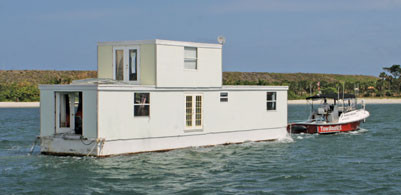Earlier this year, the U.S. Supreme Court decided in the case of Lozman v. City of Riviera Beach that Fane Lozman’s floating home was not a “vessel.†To the average boat owner, it may not appear significant, but the cornerstone of admiralty law jurisdiction rests directly upon the finding that the structure involved in a given case is a “vessel.â€
Before Lozman, the courts had endorsed the “anything that floats†approach to defining vessels. Now, the Court has developed the “reasonable observer’s test†– holding that Lozman’s floating home was not legally a vessel. In the words of the poet James Whitcomb Riley, if it walks like a duck and swims like a duck and quacks like a duck, it must be a duck. But for the fact that it floats, nothing about Lozman’s home suggests that it was designed to any practical degree to transport persons or things over water.
Lozman’s plywood structure had empty bilge space underneath the main floor to keep it afloat. He had it towed several times before deciding on a marina owned by the City of Riviera Beach, Fla. After various disputes with Lozman and unsuccessful efforts to evict him, the city brought a federal admiralty lawsuit against his floating home, had the U.S. marshal arrest the vessel, and filed suit to foreclose a lien for dockage fees and damages for trespass. Lozman moved to dismiss the suit, claiming that the structure was not a vessel – as is required for admiralty jurisdiction.
With Lozman representing himself, the district court found the floating home to be a vessel. Maritime law defines a “vessel†as including “every description of watercraft or other artificial contrivance used, or capable of being used, as a means of transportation on water.†The trial court concluded that admiralty jurisdiction was proper, and awarded the city dockage fees and nominal damages. The city then bought the floating home at the marshal’s sale, towed it away and had it destroyed. Lozman appealed, but the 11th Circuit affirmed, agreeing that the home was a vessel.
On appeal, the Supreme Court reversed indicating that not every floating structure is a vessel. “To state the obvious, a wooden washtub, a plastic dishpan, a swimming platform on pontoons, a large fishing net, a door taken off its hinges, or Pinocchio (when inside the whale) are not ‘vessels,’ even if they are ‘artificial contrivance[s]’ capable of floating, moving under tow, and incidentally carrying even a fair-sized item or two when they do so. Rather, the statute applies to an ‘artificial contrivance . . . capable of being used . . . as a means of transportation on water.’â€
The Court reasoned “[b]ut for the fact that it floats, nothing about Lozman’s home suggests that it was designed to any practical degree to transport persons or things over water. It had no rudder or other steering mechanism.†Its hull was unraked and it had a rectangular bottom 10 inches below the water. With no special capacity to generate or store electricity, the home could only obtain utilities through ongoing connections with the land. Its small rooms looked like ordinary non-maritime living quarters. The Supreme Court found Lozman’s home differed significantly from an ordinary houseboat in that it had no ability to propel itself.
To determine if the craft involved is a “vessel,†the Court identified criteria the reasonable observer should review, including the use of the structure, its waterborne function and whether the structure is engaged in transportation. The Court also recognized original design is not always determinative – “[a] craft whose physical appearance and activities objectively evidence waterborne transportation purpose or function may still be rendered a non-vessel by later physical alterations – such as the Queen Mary – which is connected permanently to land.
Justice Sotomayor’s dissent expressed, “Without knowing whether a particular ship is a vessel, it is impossible for lenders to know how properly to characterize it as collateral for a financing agreement because they do not know what remedies they will have recourse to in the event of a default. … Similarly, cities like Riviera Beach provide docking for crafts like Lozman’s on the assumption that such crafts actually are ‘vessels’.â€
In maritime cases, the effect of Lozman was immediate. The Supreme Court has since remanded another case in which the trial court determined that the Crown Casino was a vessel and observed that it has been affixed in its dockside location since 2001 by lines and cables. In January, the Court also denied a Jones Act seaman’s claim determinign the Red Hawk Spar (a floating oil-production facility permanently moored in over 5,000 feet of water in the Gulf of Mexico) was not a “vessel†for the purposes of the Jones Act. As a result, the claimant was not a Jones Act seaman because he had no connection with a vessel in navigation.
Based on the Lozman case, there will be structures that marine insurers will have to take a second look at to determine if they are insurable as vessels under the concepts of “marine insurance.†Marinas will not know whether the tenant’s craft is a vessel against which they can impose a maritime lien for dockage fees or whether they must bring a landlord/tenant eviction proceeding to evict the craft. There will be injured workers who are not sure if they are seamen or land based workers. In Many other cases, the basis for admiralty jurisdiction will rest on the finding of a vessel.
Capt. Robert L. Gardana is a licensed U.S.C.G. master and maritime attorney for over 30 years and may be reached at Gardanalaw@gmail.com (website: www.BoatLawyer.com).





